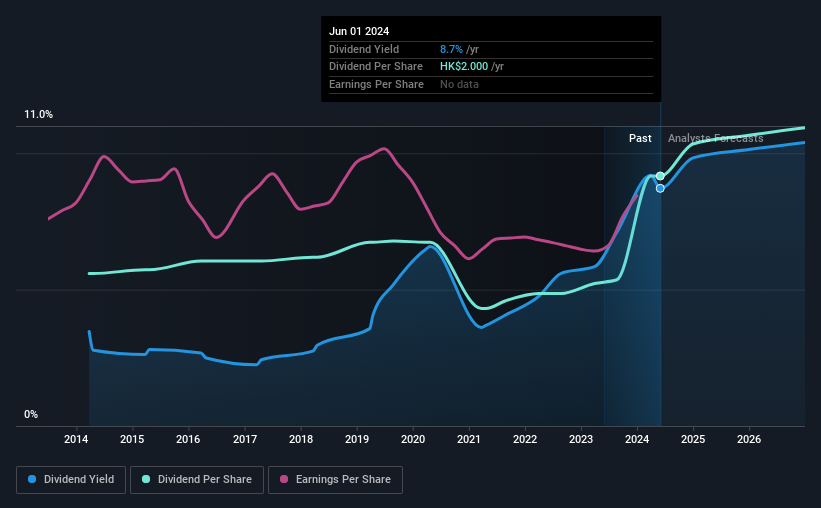Dah Sing Financial Holdings (HKG:440) Is Increasing Its Dividend To HK$1.64
The board of Dah Sing Financial Holdings Limited (HKG:440) has announced that it will be paying its dividend of HK$1.64 on the 20th of June, an increased payment from last year's comparable dividend. This makes the dividend yield about the same as the industry average at 8.7%.
While the dividend yield is important for income investors, it is also important to consider any large share price moves, as this will generally outweigh any gains from distributions. Investors will be pleased to see that Dah Sing Financial Holdings' stock price has increased by 40% in the last 3 months, which is good for shareholders and can also explain a decrease in the dividend yield.
See our latest analysis for Dah Sing Financial Holdings
Dah Sing Financial Holdings' Payment Expected To Have Solid Earnings Coverage
We like to see a healthy dividend yield, but that is only helpful to us if the payment can continue.
Dah Sing Financial Holdings has established itself as a dividend paying company with over 10 years history of distributing earnings to shareholders. Taking data from its last earnings report, calculating for the company's payout ratio shows 40%, which means that Dah Sing Financial Holdings would be able to pay its last dividend without pressure on the balance sheet.
Looking forward, EPS is forecast to rise by 14.3% over the next 3 years. Analysts forecast the future payout ratio could be 42% over the same time horizon, which is a number we think the company can maintain.

Dividend Volatility
The company's dividend history has been marked by instability, with at least one cut in the last 10 years. Since 2014, the dividend has gone from HK$1.22 total annually to HK$2.00. This implies that the company grew its distributions at a yearly rate of about 5.1% over that duration. A reasonable rate of dividend growth is good to see, but we're wary that the dividend history is not as solid as we'd like, having been cut at least once.
Dividend Growth May Be Hard To Achieve
Growing earnings per share could be a mitigating factor when considering the past fluctuations in the dividend. In the last five years, Dah Sing Financial Holdings' earnings per share has shrunk at approximately 2.7% per annum. Declining earnings will inevitably lead to the company paying a lower dividend in line with lower profits. Earnings are forecast to grow over the next 12 months and if that happens we could still be a little bit cautious until it becomes a pattern.
Our Thoughts On Dah Sing Financial Holdings' Dividend
Overall, we always like to see the dividend being raised, but we don't think Dah Sing Financial Holdings will make a great income stock. The low payout ratio is a redeeming feature, but generally we are not too happy with the payments Dah Sing Financial Holdings has been making. This company is not in the top tier of income providing stocks.
Market movements attest to how highly valued a consistent dividend policy is compared to one which is more unpredictable. However, there are other things to consider for investors when analysing stock performance. As an example, we've identified 1 warning sign for Dah Sing Financial Holdings that you should be aware of before investing. If you are a dividend investor, you might also want to look at our curated list of high yield dividend stocks.
New: Manage All Your Stock Portfolios in One Place
We've created the ultimate portfolio companion for stock investors, and it's free.
• Connect an unlimited number of Portfolios and see your total in one currency
• Be alerted to new Warning Signs or Risks via email or mobile
• Track the Fair Value of your stocks
Have feedback on this article? Concerned about the content? Get in touch with us directly. Alternatively, email editorial-team (at) simplywallst.com.
This article by Simply Wall St is general in nature. We provide commentary based on historical data and analyst forecasts only using an unbiased methodology and our articles are not intended to be financial advice. It does not constitute a recommendation to buy or sell any stock, and does not take account of your objectives, or your financial situation. We aim to bring you long-term focused analysis driven by fundamental data. Note that our analysis may not factor in the latest price-sensitive company announcements or qualitative material. Simply Wall St has no position in any stocks mentioned.
About SEHK:440
Dah Sing Financial Holdings
An investment holding company, provides banking, insurance, financial, and other related services in Hong Kong, Macau, and the People’s Republic of China.
Proven track record with adequate balance sheet and pays a dividend.
Market Insights
Community Narratives




